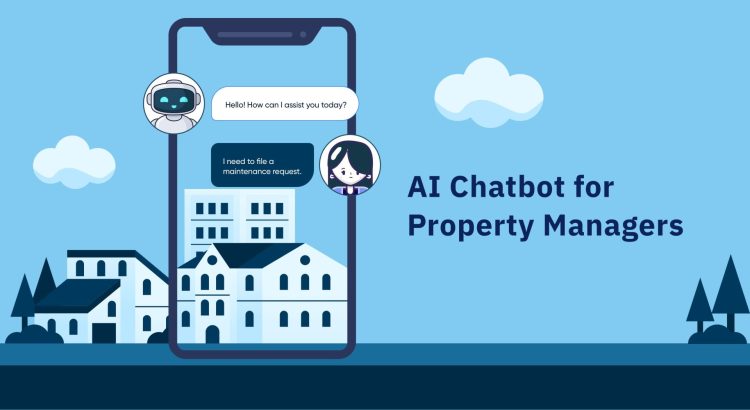Managing tenant complaints is tricky.
Tenants want quick resolution for issues with their living spaces, and rightly so; a leaky roof or a clogged sink are not issues patience can solve.
But attending to them at warp speed is by no means easy. Property managers are overextended for one. Between marketing and maintenance, they have a lot going on.
What if this tricky problem had a solution?
AI Chatbot: The 24x7 Complaint Hotline
Complaint management is a job that AI chatbots can handle with ease thanks to their ability to understand user intent and process complex scenarios easily. Chatbots can handle a large number of complaints at the same time, prioritize them based on urgency and severity, and assign them to respective maintenance teams for resolution.
Compare this to the everyday reality of property managers—handling dozens of phone calls and voicemails to fix one leaky faucet or faulty air conditioning! In a large residential or commercial complex, problems can be many times over. With a chatbot in tow, property managers can take it easy as it takes care of the entire process from registration to resolution.
Across industries, businesses are recognizing the value of these virtual assistants in delivering faster service to customers. Advances in artificial intelligence technology, which has spawned bots that are adept at handling queries like humans, and the reduced cost of service delivery have turned them into an important asset for businesses.
Easy to Adopt, Easy to Use
A good thing about AI chatbots is that they are incredibly easy to use.
Though powered by cutting-edge technologies such as Natural Language Processing (NLP), to users they present an intuitive interface that can be navigated easily using clicks, taps, voice, or text (depending on the medium used by the chatbot). The chatbot's human-like cognitive and communication skills simplify interactions, keeping the user’s intent and context in perspective.
How AI Chatbot for Complaint Management Works
The chatbot streamlines complaint management, from intake to feedback collection, minimizing speed bumps and tenant frustration.
- Problem Identification
Once the tenants submit their complaints or requests via text input, the chatbot—powered by LLM—assesses the key entities and context from them. Large Language Models or LLMs are machine learning models that can understand and generate human text. The LLM underlying the chatbot is fed with vast amounts of language data, which makes it adept at recognizing and interpreting human language or other types of complex data. LLMs leverage a type of machine learning known as deep learning to comprehend how words and sentences function together.
- Complaint Prioritization
A rule-based structured questioning system asks targeted questions to assess the cause and severity of the problem. The bot also leverages root-cause flow diagrams and a comprehensive troubleshooting document corpus to automatically configure its decision-making. These improve the bot’s ability to take a tailored approach to complaint prioritization and resolution.
- Ticket Generation
After the relevant information is gathered, the chatbot—integrated with a ticketing system—generates a ticket for issue resolution. Based on the nature of the complaint, the bot assigns the ticket to the concerned maintenance crew for resolution. The ticket status is updated in the system as and when progress is made, keeping the tenants informed on the resolution timeline and outcomes.
- Human Handover
In case of complex queries or if human assistance is required, the bot seamlessly transfers the request to a live agent. This ensures tenants get the required support when called for, maintaining a high level of service quality.
- Feedback and Data Collection
Once the issue is resolved, the feedback is collected and stored in the chatbot’s database. The collected data is used to enrich the bot’s knowledge base, identify bugs, refine responses, and train it to be more accurate in the future. All of these steps help improve the chatbot’s performance over time.
- Personal Data Filtering
Storing conversational data and corresponding personal information raises important concerns about privacy. Although this info is used to enhance the chatbot’s performance and improve user experience, poor data handling practices and threats from hackers and third-party sharing are valid risks. With specifically designed PII Data filtering, the data provided by the users can be handled more securely.
Check out how QBurst's intelligent AI chatbot solution streamlines complaint management for a leading luxury property developer in the U.S.
The AI Chatbot Advantage for Property Managers
- Happier Tenants
From referrals to renewed leases, a lot hinges on tenant satisfaction. Being heard and having problems solved is a large part of what contributes to that satisfaction. The chatbot’s 24x7 availability, speedy complaint registration, and transparency take care of this to a great extent.
- Efficient Property Management
Extensive evidence supports the automation of repetitive processes such as complaint management. 90% of businesses report faster complaint resolution with chatbots. No matter how big the property, property management companies can rely on the chatbot to execute the job on their behalf instead of hiring extra hands. Once the chatbot is up and running, it does not need expensive maintenance, which saves significant costs in the long run.
- Business Growth
The data and feedback collected by the bot can help enhance the chatbot’s efficiency. Insights from this data can also inform strategic decisions within the company, such as identifying areas for proactive, rather than reactive, intervention.
Stay tuned for a follow-up post that unravels the technical nitty-gritty of this bot. Want an AI chatbot implemented for your business? Reach out to us!


